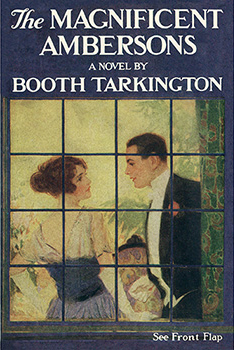Film
The Magnificent Ambersons was adapted by Jay Pilcher for a Vitagraph Pictures feature film titled Pampered Youth (1925), [6] directed by David Smith and starring Cullen Landis, Ben Alexander, Allan Forrest, Alice Calhoun, Emmett King, Wallace MacDonald, Charlotte Merriam, Katheryn Adams, Aggie Herring and William Irving. [7] [8] After Vitagraph was purchased by Warner Bros., the 70-minute film [9] was reedited to 33 minutes and released under the title Two to One (1927). [10] The original film is considered lost.
Orson Welles adapted the story for his second feature film, The Magnificent Ambersons (1942), starring Joseph Cotten, Dolores Costello, Anne Baxter, Tim Holt, Agnes Moorehead, and Ray Collins, with Welles providing the narration. Welles lost control of the editing of the film to RKO Pictures, and the version released to audiences differed significantly from his rough cut. More than an hour of footage was cut by the studio, which also shot and substituted a happier ending. Welles's extensive notes for how he wished the film to be cut have survived, but the excised footage was destroyed. Composer Bernard Herrmann insisted his credit be removed when, like the film itself, his score was heavily edited by the studio. [11] Even in the released version, The Magnificent Ambersons is often regarded as among the best American films ever made. [12] [13]
In 2002, the A&E Network aired its original film The Magnificent Ambersons , directed by Alfonso Arau and starring Madeleine Stowe, Bruce Greenwood, Jonathan Rhys Meyers, Gretchen Mol, Jennifer Tilly, Dina Merrill and James Cromwell. [14]


